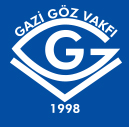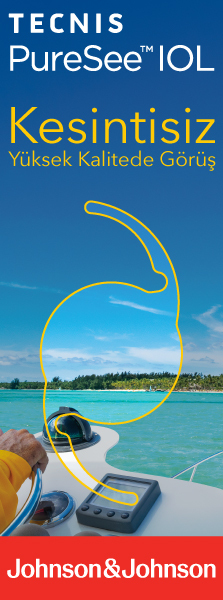2M.D., Augenärztliche Gemeinschaftspraxis Dr. A. Longere, Prof. Dr. Med. M. Reichel, Konstanz, GERMANY
3M.D. Associate Professor, Dokuz Eylul University Faculty of Medicine, Department of Ophthalmology, İzmir/TURKEY
4M.D. Professor, Dokuz Eylul University Faculty of Medicine, Department of Radiology, İzmir/TURKEY
5M.D. Professor, Dokuz Eylul University Faculty of Medicine, Department of Ophthalmology, İzmir/TURKEY Purpose: To investigate the clinical course and treatment outcome 6 eyes of 5 patients with acute retinal necrosis (ARN).
Materials and Methods: Retrospective case series.
Results: The data of six eyes of five patients with ARN was evaluated retrospectively. Mean age was 48.6 and mean follow-up was 46.6 months. At baseline, three patients were affected unilaterally and one, bilaterally. Fellow eye of one patient was phtisic and this was most likely due to ARN. At the time of presentation, best-corrected visual acuity was between hand movement and 4/10. At the end of of follow up, best-corrected visual acuity varied between no light perception and 9/10. Vitreous tap and intravitreal ganciclovir injection was performed in 5 eyes of 4 patients. Varicella zoster virus DNA in 2 patients and HSV-1 DNA in 2 patients were detected by PCR. Parenteral acyclovir was administered immediately after the clinical diagnosis for 10 days and later oral acyclovir was maintained for a mean duration of 11,8 weeks. During the follow-up rhegmatogenous retinal detachment developed in 5 eyes of 4 patients and encircling with standard 20 G pars plana vitrectomy with silicone oil endotamponade were performed. Acute retinal necrosis did not develop in any of the fellow eyes during the follow-up.
Conclusions: ARN may result in severe visual loss. Satisfactory visual results can be achieved by prompt diagnosis and effective treatment. Polymerase chain reaction can quickly and efficiently support the diagnosis and in addition to systemic antiviral agents intravitreal ganciclovir therapy may also be employed.
Keywords : Acute retinal necrosis, Herpes simplex virus, uveitis, vasculitis, varicella zoster virus




